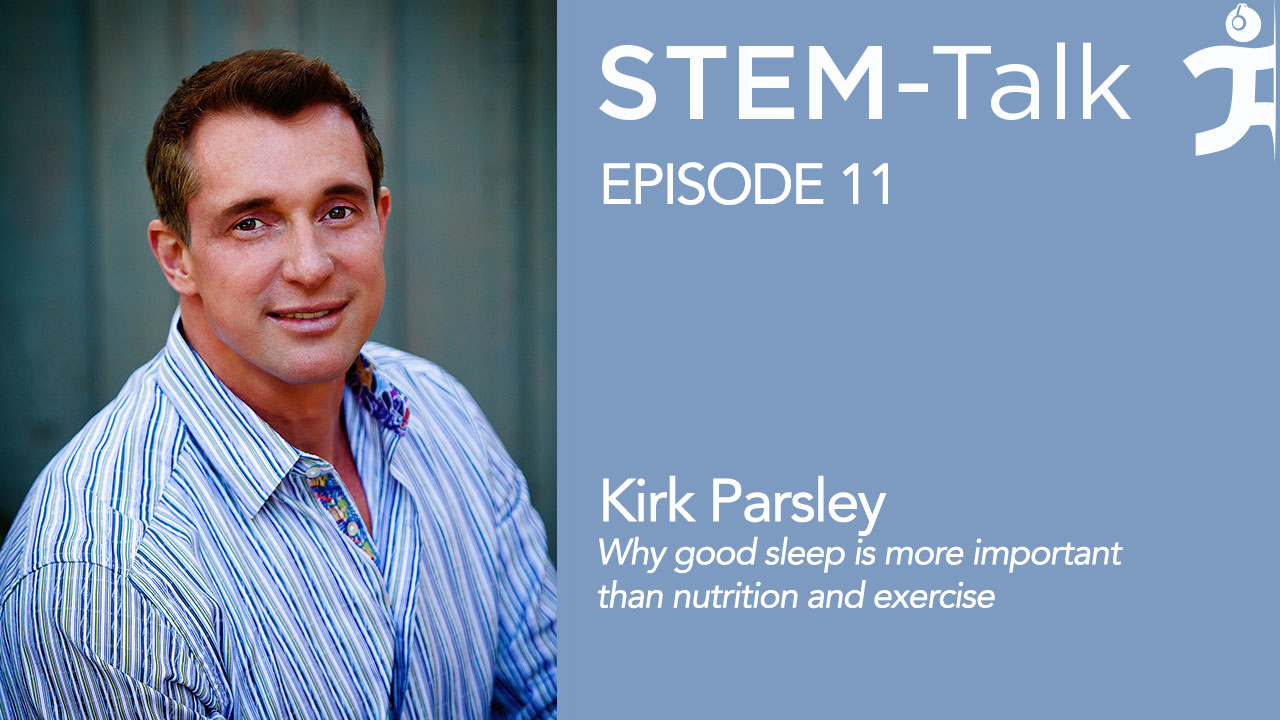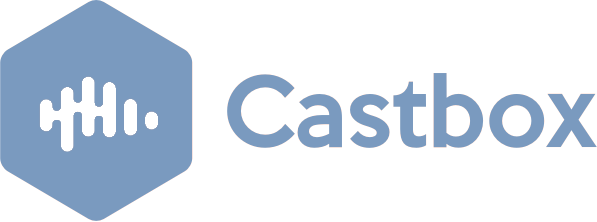STEM-Talk
Episode 11: Kirk Parsley discusses why good sleep is more important than nutrition and exercise
// May 10, 2016

If we could only sell people on the importance of sleep as successfully as we sell them on the pleasures of sex, we’d have a much healthier—and happier bunch. This is one of sleep expert Kirk Parsley’s messages.
Parsley calls sleep “the greatest elixir,” and places its importance above that of both exercise and nutrition. Yet, this simple physiological need is hard to satisfy in a society that glorifies business and overworking—and loves its electronics, which don’t exactly prepare the body for sleep.
Parsley discusses these and other issues with STEM-Talk host Dawn Kernagis. He talks about how his background as a Navy SEAL led him to a career in medicine, focused on sleep. He also explains why sleep is important—and how you can get more of it.
Parsley served as the Naval Special Warfare’s expert on sleep medicine, and has been a member of the American Academy of Sleep Medicine since 2006. He is also the inventor of the Sleep Cocktail, a supplement designed for the sleep optimization of Navy SEALs: http://www.sleepcocktails.com
A much sought-after sleep expert, this podcast marks Parsley’s 100th podcast interview. You can find more information on him at his web site: www.docparsley.com. You can find his TED talk at http://tinyurl.com/pw9h7qz
4:10: Dawn welcomes Kirk.
5:00: Kirk joined the Navy SEALs after high school and stayed for nearly seven years. “I quickly realized that was a young, single man’s job, and I was becoming neither.”
6:09: Kirk volunteered at the San Diego Sports Medicine Center to qualify for physical therapy school, but found the field too limited, so he shadowed doctors and decided to pursue medicine.
7:00: He attended the military’s medical school. “They were going to pay me to go to medical school instead of the other way around…”
9:58: The SEALs came to him for medical advice. “The most palatable way for me to talk about it in the military was through sleep. They didn’t really want me talking about testosterone. Adrenal fatigue is sort of a pseudo-scientific term. So inadvertently I became a sleep guy.”
10:40: “I don’t think there’s any area of your life that isn’t significantly impacted by sleep. Good quality sleep is probably the most important elixir there is.” He places it above both nutrition and exercise.
11:35: Sleep is a hard sell, with the advent of factory jobs and the idea that time is money.
13:55: “My message is the more you sleep, the more work you get done.”
14:58: “The big problem with sleep is …. Once you fall asleep until you wake up, you don’t really have any objective experience of that.”
15:50: Polysomnographs reveal that some people wake up 300 times a night, but say they slept fine.
16:13: You don’t need the same amount of sleep every day. Seven and a half hours is the average amount of sleep we aim for to enhance the immune system.
17:05: Kirk compares proper sleep to taking your daily vitamin. “You can’t really tell the true benefits of proper sleep until you’ve done it for a month or so.”
17:40: Wearable tech gadgets such as Fitbit and Jawbone measure how much you move during sleep and equate that with sleep quantity. “The truth is you could stare at your ceiling, never move, and never sleep, and it would say you got this awesome night of sleep.”
19:00: Some devices also measure heart rate variability; others, placed under your pillow or on your nightstand, record your respiratory rate. Some iPhone apps capture snoring.
19:40: Polysomnographs are the gold standard for determining how much somebody sleeps.
20:00: Everyone has a different sleep metric: mood, athletic performance, project completion rate/satisfaction.
21:12: Sleep deprivation leads to anxiety, which is already a big problem for entrepreneurs and other professionals.
21:20: Commercial break: STEM-Talk is an educational service of the Florida Institute for Human and Machine Cognition, a not-for-profit research lab pioneering ground-breaking technologies aimed at leveraging human cognition, perception, locomotion and resilience.
22:55: Stage 1 sleep is the decision to get in bed and try to start falling asleep.
23:19: Stage 2 is “pre-sleep”: when you are not quite asleep, but somewhat aware of your environment.
24:10: Stage 3 and 4 sleep is deep sleep. Delta and Theta brainwaves occur. Predominantly the first four hours are deep sleep; the last four hours are REM (rapid eye movement).
24:53: What happens during deep sleep is the opposite of fight or flight. The immune system is at its highest function; you are secreting maximal growth hormones/testosterone. It is the only time the body is repairing itself.
26:00: Some medications and alcohol interfere with deep sleep.
26:55: During REM, you experience the most most vivid dreaming; emotional categorization.
27:20: People who sleep adequately say they dream a lot because they have gotten lots of REM.
28:00: If you wake up during deep sleep, you’re going to feel bad. The adrenals have to ramp up.
29:25: Kirk discusses iPhone apps that measure sleep cycles.
31:00: During sleep, neurotransmitter changes occur in the brain, and a cleansing of the glymphatic system.
32:32: When we are tense, there is a build-up of adenosine; that’s why when we’ve had a hard day, we feel like sleeping. Sleep pressure is driven by adenosine.
33:34: People with intense schedules fall asleep easily because of a lot of sleep pressure: a lot of adrenal hormones are circulating throughout body. As soon as they flush out all of the neurotoxins/adenosine, the adrenal function wakes them up. They often say, “I fall asleep in 30 seconds” as well as, “I sleep for two hours, and I’m wide awake.”
35:24: We are the only animal that sleep deprives ourselves on purpose. The only time other animals don’t sleep is if they are being stalked by a predator or the brain senses famine.
36:42: Chronic sleep deprivation compromises our pre-frontal cortex-executive functioning, which means: our ability to make decisions and solve problems; our reaction time and attention span.
38:00: When the body is sleep-deprived, it is less anabolic; is has to secrete stress hormones to get through the day; that’s why people use stimulants.
39:17: Sleep adaptation studies show that the average person living in the Western industrialized lifestyle settles down at needing 7.5 hours of sleep.
43:05: A genetic variant allows some people to sleep less and not suffer sleep deprivation as badly as the average person.
45:00: “If you were about to have surgery, and while you were reading consent forms, the surgeon has a shot of whiskey, no one would be comfortable with that. If that guys takes a shot every two hours, he’s performing like someone who has been up for 18 hours in a row; and we accept that all the time.”
45:44: We put pilots in air who have been sleep deprived for four nights—especially transcontinental pilots.
49:28: Commercial break: STEM-Talk is an educational service of the Florida Institute for Human and Machine Cognition, a not-for-profit research lab pioneering ground-breaking technologies aimed at leveraging human cognition, perception, locomotion and resilience.
50:15: Sleep drugs go after the GABA analogues.
52:45: Sleep drugs on average shorten the time it takes to get to sleep by 15 minutes, and lengthen it by 30 minutes; but they fundamentally damage sleep architecture and damage REM sleep by 80 percent.
53:13: Over the counter drugs such as Benadryl block histamines.
53:34: Alcohol affects stages 3 and 4 sleep and REM.
54:32: Sleep drugs are helpful to get back on track if you are jet lagged or confronted with an emotional trauma. But 69 percent of people taking sleep drugs take them every night.
58:28: Kirk encourages engaging in sleep rituals with the same regularity as you might stick to a workout schedule.
1:00:24: Improve your sleep by decreasing stimulation to the brain an hour before bed by doing yoga, meditation, reading.
1:04:20: Melatonin is major hormone involved with sleep. Most people take way too much, decreasing their brain’s sensitivity to melatonin. From the time the sun goes down, your brain will only produce between 3 and 6 micrograms of melatonin.
1:08:18: Kirks discusses the link between sleep deprivation and depression.
1:09:00: Kirk discusses his sleep supplement. It can cross blood brain barrier. It’s low-dose, for sleep initiation. It’s meant to compensate for whatever is sub-optimal about sleep habits.
1:11:19: Mentions web site: www.docparsley.com where you can see other podcasts, read blogs, find more information. Web site is being re-launched: Will have new blog.
1:12:15: His sleep drug, sleep cocktail, will be renamed because a lot of people think it’s an alcoholic drink.
1:13:43: Dawn thanks Kirk.
1:14:09: STEM-Talk’s “double secret selection committee” may invite Kirk back for a second interview as there is much more to discuss.
1:14:23: Dawn and Ken mention that Dr. Parsley will be visiting IHMC and giving a public lecture in the Evening Lecture Series.
1:14:29: Dawn and Ken thank the audience for terrific support during the launch of STEM-Talk and mention that STEM-Talk was immediately featured in iTunes’ New and Noteworthy category and was actually in the top position at one point. It has pretty consistently been #1 in both the Science & Medicine and Natural Sciences categories.
1:15:02: Dawn invites the audience to visit the the STEM-Talk webpage where one can find the show notes for this episode and all others.
1:15:10: Dawn and Ken sign off.






